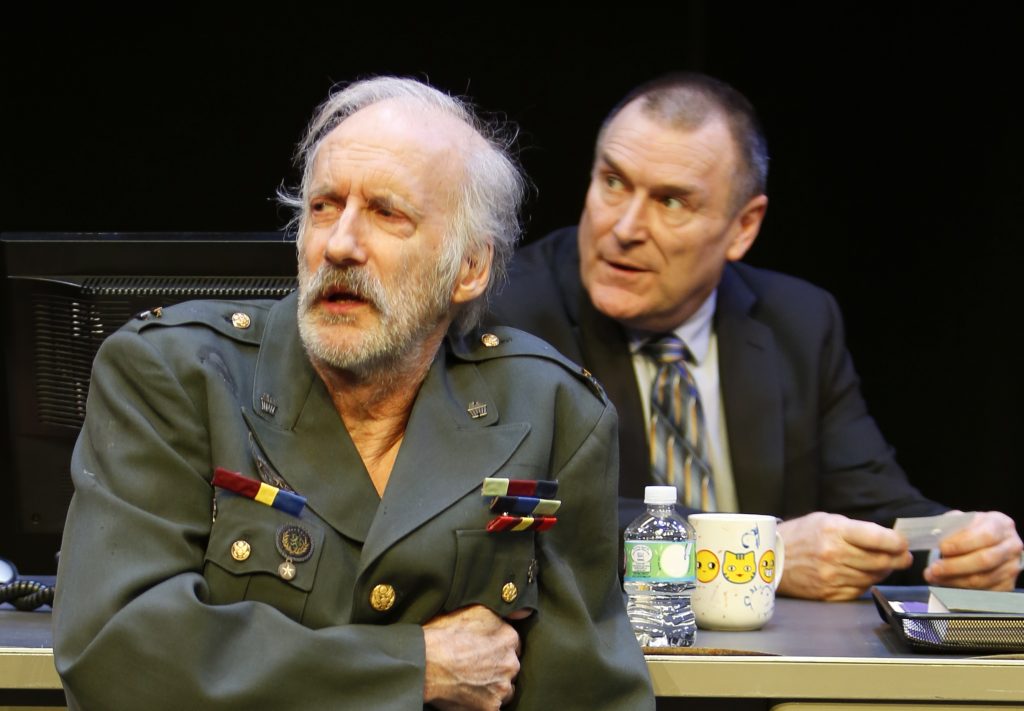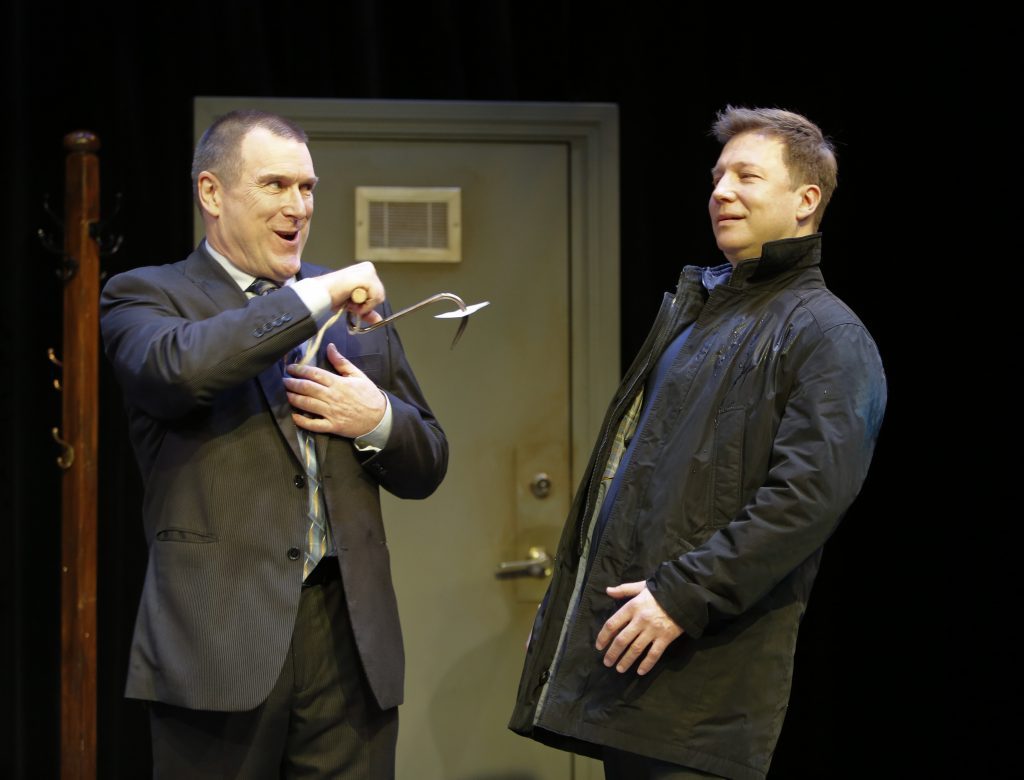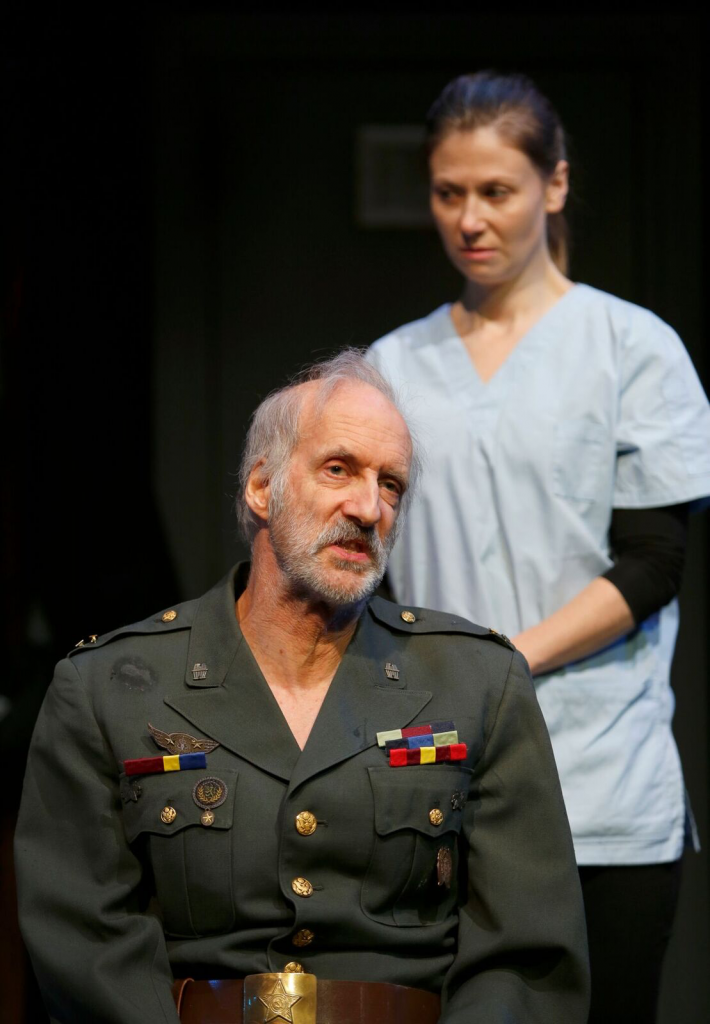
Credit: Tim Matheson
At The Cultch until March 31, 2018
Tickets from $22 at thecultch.com or 604-251-1363
Posted March 22, 2018
Karma is good: what goes around comes around. But it’s slow and by the time the bad guys get their comeuppance, you might not be around to relish it. Revenge, on the other hand, can be quick and satisfying but we all know it’s not a great idea. It either comes to a bad end or it never ends. Butcher doesn’t tell us anything we haven’t already figured out.
Prime Cuts Collective was formed for the express purpose of producing Butcher, written by Nicolas Billon whose Iceland, presented by Dirt Road/Iceland Equity Co-op back in 2014, was an absolute scorcher. It was gritty, riveting and excitingly theatrical under the direction of Kathleen Duborg. If you wanted to know how good people can be coerced into doing bad things, Iceland was a hair-raising example.
Billon revisits that same question in Butcher but it plays out like a movie of the week; the playwright’s TV and screenwriting roots are showing. The script is literal, the set is absolutely realistic – a desk, a chair, a filing cabinet – and nothing about this production, directed by Kevin McKendrick, uses live theatre’s unique advantages – creativity, innovation and imagination. WYSIWYG: what you see is what you get in Butcher.

Credit: Tim Matheson
What you get is a plot that is full of twists and turns you will not see coming. And when you think you’ve seen them all, another one comes at you. Does anyone remember The Mad Mouse roller coaster? Butcher is like that. Three hundred and sixty degree plot turns leave you with whiplash. I admire the ingenuity of the plot; I just think Butcher is better suited to film or TV.
The drugged, unconscious body of a man (played by Peter Anderson), wearing a highly decorated general’s uniform, has been dropped off at the police station by two strangers who fled the scene. Hanging around the man’s neck is a butcher’s hook on a necklace of rope. Impaled over the hook is the business card of Hamilton Barnes (Noel Johansen), a copyright lawyer who has been called in for questioning. It’s Christmas Eve, Inspector Lamb (Daryl Shuttleworth) is eager to get home to his wife and two little girls about whom he goes on and on. The general, when roused, speaks a language that the lawyer thinks might be Lavinian (a language created by Christina E. Kramer and Dragana Obradović for the play) so a translator (Lindsey Angell) is called in.

Credit: Tim Matheson
Who is the man? Why is the lawyer’s business card, on which, when translated, reads, “Arrest me”, on the butcher’s hook? Who dropped the man, obviously drugged and tortured, off?
The program notes quote Nietzsche: “Whoever fights monsters should see to it that in the process he does not become a monster. And if you gaze long enough into an abyss, the abyss will gaze back into you.”
The abyss is eventually revealed and I guarantee you will be surprised.

Credit: Tim Matheson
Angell is ferocious in her verbal sparring matches with all three characters. She was spectacular in Iceland and she’s fierce in Butcher, too. Peter Anderson deftly speaks Lavinian throughout and there are times – but not too often – when you wonder where the subtitles are. Shuttleworth is convincing as thick-witted Inspector Lamb, especially when his character gets a phonecall from his seven-year-old who’s worried Santa has forgotten where she lives. This production would work better if we cared more for Hamilton Barnes, the lawyer. Johansen’s performance is guarded – as it needs to be – but it comes off rather bland so it’s difficult to invest in Barnes.
And then there’s the play’s overarching message about revenge that we already know.
Butcher is not Billon’s finest play but there’s a chilling note struck late in the eighty-minutes that resonated with me and got me where guilt lives: as a safe, secure society are we becoming not only indifferent to the suffering in faraway lands but actually bored by it? What kind of monsters are we?

